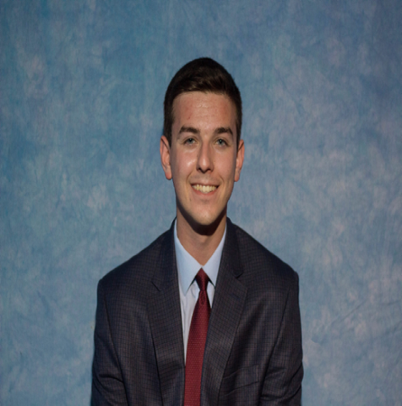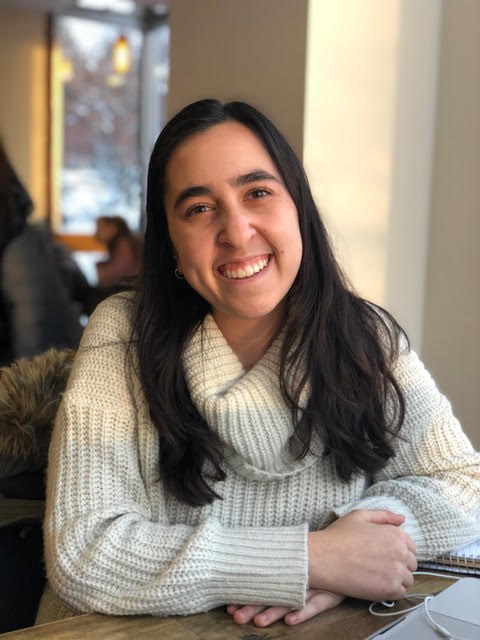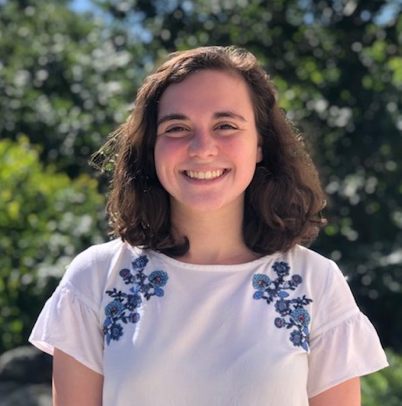Senior Theses
Here are some descriptions and pieces of advice from recent senior thesis writers
Mollie Goldfarb '20
Major: Politics
Minor: Legal studies
Title of Thesis: “On Our Nation’s Conscience” (working title)
Advisor: Daniel Breen
How the idea was created: My thesis advisor, Professor Breen, helped me work through many ideas when brainstorming for my thesis. However, I originally thought of the broader topic because of my coursework and the current news cycle.
Obstacles: I found it hard to find specific research materials for some topics and on the other hand, faced having too much literature on other topics! I learned to balance this when I felt I included enough information to justify my argument, while also being concise and clear in my writing
Helpful resources of guidance/inspiration: I turned to Professor Breen for many of my concerns during the process and for help in shaping or articulating my argument. Whether it be middle-of-the night thoughts later sent in frantic emails or regular drop-ins to talk, I was consistently reassured by Professor Breen that my research was strong and moving forward in the right direction.
 Ben Katcher '20
Ben Katcher '20
Majors: HSSP and Biology
Title of my thesis: "A Deeper Look into Bullying Culture, and its Effects on Incoming College Students"
Advisor: Wendy Cadge
How the idea was created: I came into college wanting to make a difference for bullying victims, and with its longstanding history of passionate activism, I knew Brandeis would be the right place for me. After taking sociology classes in my first year, and falling in love with the field, I realized that sociological research would be the perfect vehicle for turning my idea into a tangible project. I reached out to Professor Wendy Cadge in the Spring of my sophomore year simply with the hope of getting my foot in the door of this kind of research. However, she stunned me by asking about my personal interests right from the start, and my idea soon turned into a sociological examination of how past bullying victimization affects incoming college students and the overall college experience. Professor Cadge then helped me draft various grant proposals, and I was awarded the Provost's Undergraduate Research Fund award for summer 2018. I spent most of the summer finding sources, crafting my literature review and setting up a comprehensive timeline for my project. By the end of the summer, I had decided that I wanted to turn this independent research project into my thesis for the HSSP major.
Obstacles: In terms of obstacles I have faced, though, I had no prior research experience before starting this project. However, Brandeis has always given me access to a plethora of resources along the way.
Helpful resources of guidance/inspiration: First and foremost, my thesis advisor, Professor Cadge, has been my most important resource. Despite not having any academic experience with bullying, she has used her research expertise to help guide me along the way. She also showed me how valuable the various librarians are on campus. Maric Kramer, for example, showed me how to find sources for my literature review by using the various databases that Brandeis has access to. In addition, Margarita Corral showed me how to use Atlas.ti in order to properly code my interview transcripts. I came to Brandeis with something that I was passionate about, and Brandeis has provided me with all the necessary resources to bring it to life.
Funding: The following summer, I was awarded the Provost's Undergraduate Research Fund award once again, along with the Schiff Fellowship for the 2019-2020 academic year. I spent that summer writing my IRB proposal (which included my recruitment materials, consent form and interview guide among other things) in order to receive approval to conduct interviews with current students who self-identified as being bullied before entering college. I have spent this academic year conducting, transcribing and coding interviews, and am now in the middle of actually writing the thesis itself.
 Miriam Berro Krugman '20
Miriam Berro Krugman '20
Major: Sociology
Minors: Social Justice & Social Policy; Peace, Conflict, & Coexistence Studies; Women’s, Gender, & Sexuality Studies
Title of Thesis: TBD
Advisors: Gowri Vijayakumar & Michael Strand
How the idea was created: I ultimately decided to do a comparison of the Argentine and American abortion rights movements as I had just returned from studying abroad in Buenos Aires, Argentina.
Obstacles: Writing my thesis of course has consisted of obstacles in terms of organization, finding information, structuring my work, etc.
Helpful resources of guidance/inspiration: My time abroad was a big inspiration for me, and then my two thesis advisors have been great guides throughout this process.
Evan Moloney '20
Majors: Psychology (primary), Politics
Thesis title: Harassment, Coercion, and the Agonistic Continuum: Exploring the Structure of Sexual Aggression
Advisor: Raymond Knight
How the idea was created: My thesis topic is based upon earlier work by my thesis advisor Knight et al., who established a model to explain harmful sexually aggressive behaviors, both verbal and physical. While the earlier research focused much more heavily on severe sexual aggression (coercion, assault, and sadism), I noticed that the model did not tackle behaviors on the lower end of a severity continuum, including 'soft' verbal coercion and harassing behaviors, at nearly the same level of detail. I chose to construct and validate theoretical models that integrate sexually aggressive behaviors across all levels of severity, and assess the perpetrator characteristics that tie different individual behaviors and characteristics to one another.
Obstacles: The thesis required a great deal of conceptual work in advance of data analysis in order to develop the proper a priori hypotheses. As a result, the literature review was extensive, and the introduction required several drafts before data analysis could begin. Also, the thesis relies heavily on confirmatory factor analysis and structural equations modeling, which are not taught as a part of undergraduate psychology statistics. As a result, I had to spend significant amounts of time learning these analytical methods, as well as the software that would allow us to run our analysis.
Helpful resources of guidance/inspiration: Dr. Ray Knight was instrumental in guiding my thinking and education in the necessary areas for this project. My second reader, Dr. Hannah Snyder, provided valuable perspective on data analysis and statistical methods, and thesis coordinator Dr. Ellen Wright did a great job setting up opportunities for this year's twelve thesis students to learn. Dr. Wright was also a special personal mentor to me, as was the Knight lab's Ph.D. student Diane Rohrer, and the entire Knight lab gave me support and encouragement throughout the process. Finally, my faculty mentor Jytte Klausen--at the Western Jihadism Project, the other lab where I work--and the lab's manager, Rosanne Libretti both provided invaluable additional guidance and perspective.
Funding: I have received funding from the Provost's Undergraduate Research Fund for the summer of 2019, at the amount $5,000. This funding allowed me to do substantial preliminary work over the summer, on campus, which I would not have been able to do otherwise.
 Candace Ng '20
Candace Ng '20
Major: Psychology
Minors: Economics and German Studies
Title of thesis: “Effects of Religion on Depression and Risky Behavior”
Advisor: Ellen Wright
How the idea was created: Before my thesis, I had no experience doing psychology research, and wanted to try something new. As I am interested in mental health, I reached out to Dr. Wright, my major advisor, about doing an independent study. Dr. Wright encouraged me to consider doing a thesis instead, and after a lot of deliberation and prayer, I decided to do so.
Obstacles: I faced a lot of obstacles in the initial stages during the fall semester. I had considered writing a thesis for months leading up to my senior year—and almost decided not to—but did not commit till September. Even after deciding to write a thesis, I struggled a lot with narrowing down on a research question (which I did not finalize until almost November). Thankfully, my advisor, Dr. Wright, was very supportive throughout the process and was able to identify what I was interested in and what I was able to do within the time constraints.
Helpful resources of guidance/inspiration: I consider my faith to be my inspiration. My Christian faith is why I do what I do, and one of the reasons I am writing this thesis is to honor God in my academics. My faith journey has inspired me to further explore the relationship between religion and depression, and I hope that through this study, I can have spiritual conversations with people about my faith. Besides God, the Child and Adolescent Research on Development (CARD) lab and the thesis honor’s symposium are people I have turned to for guidance and inspiration.
 Melanie Rush '20
Melanie Rush '20
Majors: History, Politics
Minor: Legal Studies
Title of Thesis: Universities and Slavery (subtitle TBD)
Advisor: Michael Willrich
How the idea was created: In a legal history class I took junior year with Professor Willrich, we learned about a few instances in which white college students originally from the South would bring their own enslaved individuals with them to northern universities. That notion of slavery as an integral, yet often invisible, element of university life became fascinating for me. The more I dug into this topic, I found out that Yale University, Brown University, and Harvard University had all released reports in the early 200's which detailed their institutions linkages with slavery. This wave of research and dialogue gave me pause, because the archival materials that "unearthed" this history had been sitting around all this time. So my questions became: Why now? What sparked this call for redress of historical injustice in relation to slavery? And how does this research impact the legacy of systemic racism that remains on college campuses today?
Obstacles: One of the largest obstacles I have faced throughout this process is time management. As a senior who has somehow decided to make this semester the busiest semester out of my entire college career, finding the time to devote to this project can be difficult. Yet the freedom that comes with a senior thesis means that I can largely utilize my time how I see fit. I know how I work best, and am able to schedule pockets of my time to devote solely to my thesis research or writing.
Helpful resources of guidance/inspiration: Professor Willrich has been an extremely important source of guidance for me. I originally proposed a quite ambitious thesis that involved both analytical historical work and original archival research. I soon backed away from pursuing both objectives because I was worried I would be taking on too much. Professor Willrich was the one who encouraged me to go through with my initial plan and conduct original archival research at all three universities I am studying (Yale University, Harvard University, and Brown University). Conducting that original archival research has been some of the most incredibly exciting work I have ever gotten to do, and has really shown me that history is my true passion in life.
Funding: I received funding from the Provost Undergraduate Research Fund and the Brandeis History Department, which paid for my visits to both Yale University and Brown University.